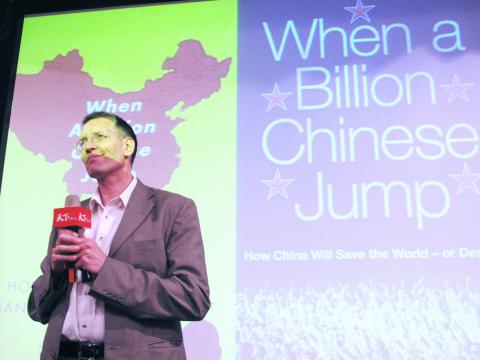|
¡@
China can learn from Taiwan¡¦s model:
Watts
CNA, with staff writer

Photo: CNA
That China¡¦s ecosystems are in peril is not breaking news,
but the speed of deterioration and the slow pace of attempts at recovery and
clean up can shock even watchdogs monitoring the toll of the country¡¦s economic
boom. That¡¦s where Taiwan comes in, a British reporter said.
In his new book When a Billion Chinese Jump, Jonathan Watts, Asia environment
correspondent for the Guardian newspaper, takes readers deep into China¡¦s
environmental abyss. The industrial giant¡¦s sprint up the economic ladder is
being made at the expense not only of its ecosystems and climate, but also of
the health of its citizens ¡X the very workforce China so desperately needs to
power its annual double-digit growth.
¡¥CANCER VILLAGES¡¦
Regarding the phenomenon of so-called ¡§cancer villages,¡¨ with about 100 to 400
spread throughout China, Watts said the disproportional rates of disease among
the residents were most likely caused by toxic-waste discharges from nearby
chemical factories.
¡§The fear of a Red China is outdated, but the hope of a green China is
premature,¡¨ the investigative journalist, who has been based in China for the
last seven years, said at a lecture in Taipei on Thursday last week.
¡§If there is any color to describe China now, it would be gray,¡¨ he said.
While China¡¦s industrial explosion has been the envy of many other countries, it
is teetering on the edge of both environmental and social implosions, Watts
said, giving examples of disappearing species and riotous protests from angry
villagers.
Being a late bloomer in terms of its economic development, China is deprived of
the option of ¡§outsourcing¡¨ its waste as was enjoyed by the UK, the US, Japan
and other countries in their takeoff phases. Beijing is therefore forced to
¡§in-source¡¨ its garbage, he said.
The bite marks resulting from China eating itself from the inside-out could be
best illustrated by the wrong hues seen around the country, Watts said, citing
examples of once-green paddy fields that are now yellow, blue rivers that have
turned crimson and crystal white glaciers that used to be feared and revered,
but are now brown and balding.
Pollution-induced human suffering is another bleak picture in China, Watts said.
In the coal town of Linfen, Shanxi Province, visited by Watts during the
research for his book, the birth-defect rate is more than three times the global
average, and the death rate of local miners per tonne of coal extracted is 30
times higher than that of their US counterparts.
However, while China¡¦s eco-crisis might be more devastating than most people
realize, Beijing¡¦s determination to go green is also much greater than the
outside world gives it credit for, he said.
As evidence, he said the Chinese government invested US$34 billion in clean
technology last year, a figure that compared favorably with the US$18 billion
spent by Washington.
China also has the world¡¦s largest wind-power capacity, and its solar-panel
industry is expanding rapidly, he said.
SOCIAL VALUES
However, a top-down strategy led by government policy would be incapable of
solving China¡¦s graying problem, and the solution must come from the grassroots
level, Watts said.
This would require a complete overhaul of social values of consumption and
conservation among the general public.
In fact, Beijing could look to Taiwan as an example of a success story in which
both citizens and government officials have an awareness of global warming and
the dire need for clean alternative energy.
Watts said that while interviewing Taiwanese officials last year in the
aftermath of Typhoon Morakot, many acknowledged the unprecedented rainfall that
left more than 700 dead or missing was likely a result of climate change and
that the country needed to accelerate its defenses against extreme weather in
the future.
Although Taiwan¡¦s carbon footprint per person is ¡§very high¡¨ and more should be
done to reduce its carbon dioxide emissions, Watts said he was ¡§extremely
impressed¡¨ by Taipei City¡¦s recycling program.
¡§I think it is a good model for China. The recycling situation in China is
appalling, frankly. There is so much waste and it is not used properly. In a
sense, it is not about techniques, but about the values ¡X wanting to recycle
used things, and I think that [awareness] is stronger here and can be carried
over to the mainland,¡¨ he said.
Watts added that multinational conglomerates, including China-based Taiwanese
companies, could contribute by cleaning up their supply chains and increasing
their efforts to amplify environmental protection as part of their corporate
social responsibility.
¡§In the 19th century, my country, Britain, taught the world how to produce. In
the 20th century, the US taught the world how to consume. And I think in the
21st century, we really need China to teach us how to sustain,¡¨ he said.
¡@
|
![]()
![]()
![]()